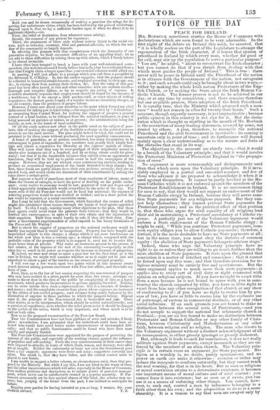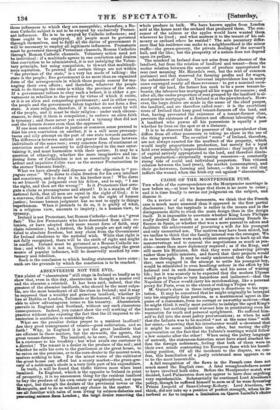TOPICS OF THE DAY
PEACE FOR IRELAND.
Mn. ROEBt'CK soinetimes startles the House of Commons with declarations which are soon found to be very admissible. In the first night of the debate on Ireland this week, he asserted, that " it is wholly useless on the part of the Legislature to attempt the regeneration of the Irish character, if it leaves that system of priesthood in Ireland by which every man, whether for good or for evil, may stir up the population to serve a particular purpose." " You are," he added, " about to reconstruct the Irish character ; but you cannot do that if you shrink from dealing with that which most guides the people of Ireland." This is true : there never will be peace in Ireland until the Priesthood of the nation is in alliance with the Government of the nation, not antagonist to it ; and such a result could only be brought about in two wave,— either by making the whole Irish nation Protestants of theEng- lish Church, or by making the State adopt the Irish Roman Ca- tholic Church. The former process is not to be achieved in our day, or at any time by compulsion ; and there remains therefore
but one available process, State adoption of the Irish Priesthood. It is equally true, that the Ministry which proposed such a mea- sure" would not remain in office for twenty-four hours." Such a measure, though urgently necessary, is yet impracticable ; because public opinion in this country is not ripe for it. But the decla- ration which is thought so startling in the mouth of Mr. Roebuck is the conviction of many leading statesmen, avowed by some, not denied by others. A plan, therefore, to reconcile the national Priesthood and the civil Government is inevitable : its coming is uncertain only in point of time ; and its furtherance will depend mainly upon a clear understanding as to the nature and force of the obstacles that stand in its way. The objections to the measure are chiefly two,—that it would be a breach of the Voluntary principle ; and that it would involve the Protestant Ministers of Protestant England in "the propaga- tion of error."
No argument is more unreasonably and disingenuously used
than that which rests upon the Voluntary principle. It is inva- riably employed in a partial and one-sided manner, and few of those who advance it arc prepared to acknowledge it when it is used against themselves. It cannot be justly levelled at the Ro- man Catholics while it is not enforced against the members of the Protestant Establishment in Ireland. It is no uncommon thing for men to say, that they would not support an endowment of the Roman Catholic clergy in Ireland, because they will never sanc- tion State payments for any religious purposes. But they can- not help themselves : they cannot prevent State payments for Protestant purposes ; and so the practical effect of that position is, that those who argue for civil equality of all religions lend their aid in maintaining a Protestant ascendancy at Catholic ex- pense. A perfectly just use of the Voluntary argument would enforce a State endowment of the Roman Catholic clergy: it might be said, "While you continue Protestant payments, com- mon equity obliges you to allow Catholic payments ; therefore, fortiori, it is the more desirable to have no State payments at all ; but in the mean time, you must obey the dictates of common equity : the abolition of State payments belongs to a future stage." Indeed, those who urge the Voluntary principle have no right to do so unless they are willing- to go much further than the mere abolition of State payments. It rests upon the ground that conviction is a matter of intellect and conscience ; that it cannot be forced upon any free man ; and that therefore provision for re- ligious ministry must be entirely free and spontaneous. But the same argument applies to much more than mere payments—it applies also to every sort of civil duty or right connected with opinion on religious subjects. If you have no right to exact tithe from a man because he is not bound to agree with you in sanc- tioning the church supported by tithe, you have as little right to exact from him any other recognition of that church or any show of conforming to it : if you have no right to coerce him by pro- cess of law, you have as little to coerce him by the exclusive use of patronage, of custom in commercial dealings, or of any other social influence. If on such grounds you are bound to make no distinction between the several sects of Protestants,—and you do not scruple to support the national but schismatic church in Scotland,—you are no less bound to make no distinction between Protestants and Roman Catholics or any other family of Chris- tians, between Christianity and Mahometanisin or any other faith, between religion and no religion. The man who resorts to the Voluntary argument without a distinct acknowledgment of all its consequences, is either grossly ignorvit or grossly dishonest.
But, although it leads to such far conclusions, it does not really
militate against State payments, except inasmuch as they are en- forced by the members of an alien church. The Voluntary prin- ciple is in certain cases an argument for State payments. Re- ligion as a worship is, no doubt, purely spontaneous, and no power on earth can make it otherwise : coercion or bribes may induce the renegade to conform outwardly, but they cannot .reach the real worship, for that is in his heart. But as soon as religious or moral conviction attains to a determinate existence, it becomes one important means of moral culture and of civil control : you cannot force it into existence ; but as soon as it exists, you can use it as a means of enforcing other things. You cannot, how- ever, to such end, control a man by influences belonging to a faith other than his own ; and the proposition to do so is a mere absurdity. It is a truism to say that men are swayed only by
those influences to which they are susceptible; wherefore, a
Ro-
man Catholic subject is not to be swayed by exclusively Protest- ant influences. He is to be swayed by Catholic influences; and those ought to be employed. All people must be governed through themselves, and to fulfil all the duties of government it will be necessary to employ all legitimate influences. Protestants must be governed through Protestant channels, Roman Catholics through Roman Catholic channels. Voluntary action need not be individual : if a multitude agrees in one conviction and desires that conviction to be administered, it is not indulging the Volun- tary principle, but using compulsion, to thwart that multitudi- nous aspiration. To pretend that certain things are not within "the province of the state," is a very lax mode of talking : the state is the people; free government is no more than an organized form of the arrangements in which those people concur for ma- naging their own affairs; and therefore, whatever the people wish to do through the state is within the province of the state. If a government refuses to obey such a behest, it is either a go- vernment in rebellion to the power by virtue of which it exists, or it is an alien and conquering government; and in either case, the people and the government taken together do not form a free state. A state religion, therefore, if it exists, must exist by will of the people, and it must be their religion : under such circum- stances, to deny it them is compulsion ; to enforce an alien faith is tyranny ; and there never yet existed a tyranny that did not cost the tyrants dearer even than the oppressed. If one man cannot either in justice or common sense pretend to foist his own conviction on another, it is a still more presump- tuous and silly attempt on the part of one state towards another. The differences between nations are greater than those between individuals of the same race; every concrete form of sentiment or conviction must of necessity be self-developed in the race enter- taining it, and must harmonize with their nature. It may he a question of ethnology, whether the more imaginative and im- posing form of Catholicism is not as essentially suited to the ardent and impulsive Celtic race as the sterner Protestantism to the sterner Teutonic family. What we have already said disposes of the objection to "pro- pagate error." Who dares to claim freedom for his own intellect and conscience, and to deny it to his brother man ? Who dares to set himself in judgment over his fellow, and to say, "I am the right., and thou art the wrong?" Is it Protestants that arro- gate a claim so presumptuous and absurd ? It is a maxim of the national faith, that all men are equal in the sight of God : it is a.converse, that all faiths must be equal in the sight of human justice; because human judgment has no teat to apply to things superhuman. When it pretends to do so, it is guilty of what in a religions view, amounts to impiety ; in a human view, to tyranny. Ireland is not Protestant, but Roman Catholic—that is a "great fact." The few Protestants who have descended from alien co- lonists, or have adopted their more recent form of faith, may claim toleration ; but, it fortiori, the Irish people are not only en- titled to absolute freedom, but may claim from the Government for Ireland obedience to the national wish. While that right is not fully recognized, there will be the strife of right and. might in conflict. Ireland must be governed as a Roman Catholic na- tion; and while it is not so, Government, neglecting the great mum of popular influence, will be deservedly mocked by con- timacy and rebellion. Such is the conclusion to which leading statesmen have come ; such are the grounds by which the conclusion is to be reached.



























 Previous page
Previous page